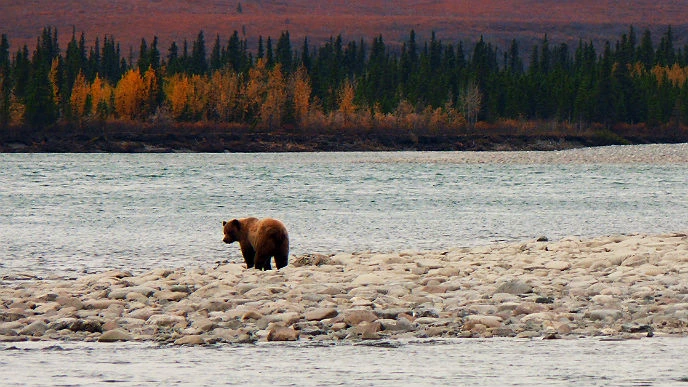
NPS Photo/Garryck Hampton One of the things that makes Noatak National Preserve special is that both brown bears (also known as grizzly bears) and black bears call it home. If you’re lucky, you might even get to see one. Even if you don't, you’ll never be far from one, because this is bear country! Brown bears like the wide-open tundra while black bears prefer the forest, although they will sometimes venture out onto the tundra in search of food. Even though the preserve is in the Arctic, there are no polar bears here. Polar bears live on the sea ice and rarely venture this far inland. Bears are curious, intelligent and potentially dangerous animals, but undue fear of bears can endanger both bears and people. Most bears tend to avoid people, and surprisingly few people ever see one. Even fewer are actually threatened by a bear. Human-bear interactions are far more likely to end in a fatality for the bear than for the human. Staying Safe in Bear CountryRespecting bears and learning proper behavior can keep you safe if you encounter a bear. Here are a few basic precautions to help keep both you and the bears safe when you’re in bear country. Stay AlertThe last thing you want to do is startle a bear. When you’re in bear country, you need to be constantly alert. The sooner you spot a bear, the more time both you and the bear have to react appropriately. Be Visible & Make NoiseBears are probably more afraid of you than you are of them, and usually the last thing they want is to encounter a human. The more noticeable you are, the more likely the bear is to vacate the area before you even see it. Try to travel in open areas with good visibility and avoid thick patches of willows. There’s safety in numbers, and traveling in a group is safer than by yourself. Be noisy, especially if you’re travelling alone or hiking where it may be noisy, such as near a creek. If you are travelling alone, be noisy. Talk to yourself, sing, clap or periodically shout, “Hey bear!” especially when rounding a blind corner. Don’t be afraid to make your presence known. Avoid BearsIf you do see a bear, resist the temptation to get closer for a better look, even if you’re in a boat. Approaching a bear can cause it to feel threatened and increases the chances that it will attack. Make sure to avoid a bear that is feeding and avoid carcasses, especially a fresh one with meat still on it. Bears cache their food, and there is a good chance that the bear is still nearby, guarding its dinner. Be especially cautious if you see a female with cubs. Never get between a mother and her cub or attempt to approach them. The chances of an attack escalate if she sees you as a threat to her cubs. Properly Store FoodDo everything in your power to avoid luring a bear into your camp. Bears will venture into camps in search of food, but once they begin to associate humans with food, they can become dangerous. Bear EncountersWe would like to hear about bear encounters! Please report any bear encounters you experience while visiting Noatak by:
Park rangers and biologists need this information to document bear behavior for research, management, and safety purposes. To learn more about bear safety, visit the National Park Service bear safety page or read the NPS brochure on Bear Safety in Alaska’s National Parklands. |
Last updated: January 27, 2025
